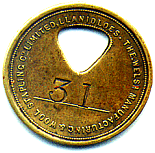
Llanidloes - the flannel makers
5
Exploitation by employers
The rapid evolution of the flannel industry included periods of depression, with serious disturbances due to low wages and poor working conditions in the 1830's.
The weaving masters set up shops on their premises where workers were forced to use tokens to buy essential goods at inflated prices, often leaving them with no wages to take home. In many cases all the members of the family would be working for the same employer, and unable to reach other shops during their opening hours. They were also likely to be sacked for buying elsewhere. These abuses contributed to the Chartist disturbances of 1839.
The tokens shown below, from a later date, are inscribed with the names of The Welsh Manufacturing & Wool Stapling Co Ltd, Llanidloes (left) and the Welsh Flannel & Tweed Company Limited (right).
Flannel industry
tokens for use in
employers shops
By kind permission
of Cyrus Meredith


It was estimated that there were some 25 weaving workshops
with a total of around 815 hand looms in operation in Llanidloes
in 1838. The weaving shops varied in size between 10 and 60 looms
each.
The flannel industry brought prosperity to the area, led to the
steady increase in the population, and made a number of mill
owners and traders very rich.
The next stage in the progress of the woven textile industry
in and around Llanidloes, as in other areas, was the advent of
steam-powered machinery and the factory system which brought
all of the processes together under one roof. This led to the
gradual closure of most of the small mills which had been sited
in often remote areas to harness water power.
There are 11 pages on the flannel industry. Use the box links below to view the other pages.